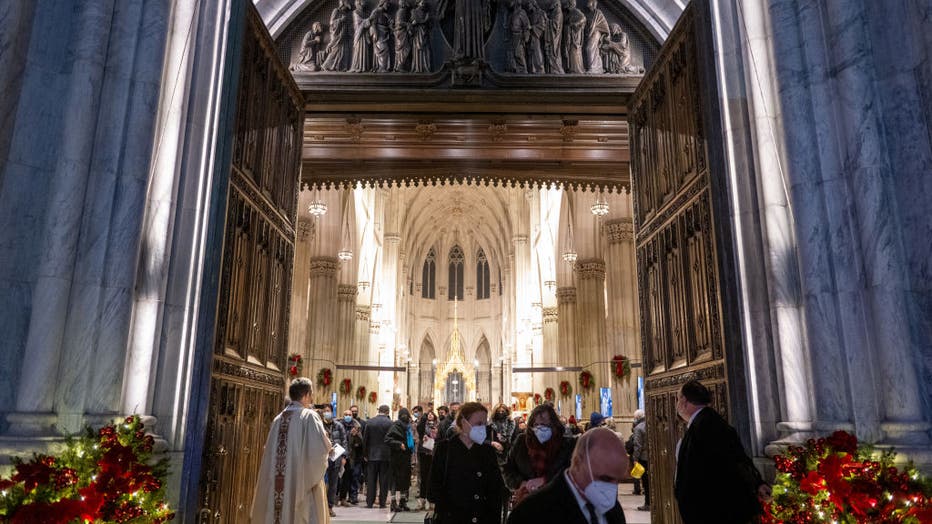Christmas Day marked with canceled flights, surging COVID-19 cases
What to know about Pfizer and Merck’s COVID treatment pills
U.S. health regulators have authorized two pills against COVID-19 that Americans can take at home, developed by Pfizer and Merck.
ROME (AP) – Christians around the world celebrated their second COVID-19 Christmas as surging infections in many countries overwhelmed hospitals, canceled flights and curbed religious observances Saturday, a point in the pandemic when coronavirus vaccines were more available than ever.
In the U.S., at least three major airlines reported canceling dozens of flights as illnesses largely tied to the omicron variant took a toll on flight crew numbers.
Delta Air Lines and United Airlines together canceled more than 600 flights on Friday and Saturday. As of early evening Friday, Delta canceled had 149 flights on Friday and 188 for Christmas Day, according to FlightAware. (Other factors, such as weather, are also causing cancellations.) United called off 189 flights on Friday, about 10% of its schedule, and 140 on Saturday. Planned cancellations continued into Sunday.
Not all airlines said COVID was disrupting their travel schedules. American Airlines said it had “nothing to report,” while Southwest Airlines said “things are running smoothly.” JetBlue, which FlightAware said had canceled nearly 150 flights over Friday and Saturday, did not respond to the Associated Press’ request for comment.
RELATED: COVID-19 surge: Here’s what’s canceled or closing across the US
The flight cancellations are the latest to sweep the country as cases continue to rise, fueled by the omicron variant.
Many churches canceled planned in-person Christmas services, and for those that did have in-person worship, clergy reported smaller but significant attendance.

NEW YORK, NEW YORK – DECEMBER 24: Parishioners leave Midnight Mass on Christmas Eve at St. Patrick’s Cathedral on December 24, 2021 in New York City. Despite rising COVID-19 cases Midnight Mass at St. Patrick’s Cathedral resumed at full capacity this
Omicron has raced ahead of other variants and is now the dominant version of the coronavirus in the U.S., accounting for 73% of new infections last week, federal health officials said Monday.
In much of the country, it’s even higher. Omicron is responsible for an estimated 90% or more of new infections in the New York area, the Southeast, the industrial Midwest and the Pacific Northwest. The national rate suggests that more than 650,000 omicron infections occurred in the U.S. last week.
Cases are rising around the globe, too.
While some countries in Asia imposed restrictions to try to contain the highly contagious omicron variant, governments in Europe and elsewhere preached common sense despite reporting record daily cases this week, advising their citizens to use masks and voluntarily limit the size of holiday gatherings.
Thousands of people across England got a vaccine booster shot for Christmas as new cases in Britain hit another daily record of 122,186.
In South Korea, social distancing rules required churches to limit worshippers to 70% of seating capacity, and service attendees had to be fully vaccinated.
South Korea has been grappling with soaring infections and deaths since it significantly eased its virus curbs in early November as part of efforts to return to pre-pandemic normalcy. The country was eventually forced to restore its toughest distancing guidelines, including a four-person limit on social gatherings and a 9 p.m. curfew for restaurants and cafes.
RELATED: South Africa’s COVID-19 case drop may show its omicron peak has passed
Australia also had a Christmas with a surge of COVID-19 cases, its worst of the pandemic, which forced states to reinstate mask mandates and other measures.
Christmas celebrations were subdued in much of India, with more decorations than crowds: Authorities reintroduced nighttime curfews and restrictions on gatherings of more than five people in big cities like New Delhi and Mumbai. People attended midnight Mass in Mumbai and elsewhere, but in smaller numbers.
As the pandemic spread around the world the past two years, New Zealand used its isolation to its advantage. Border controls kept the worst of the virus at bay. By this Christmas, New Zealand had recorded 50 deaths in a population of 5.5 million.
New Zealanders enjoyed the holiday in the warmth of mid-summer with few restrictions. Their country has one of the world’s most vaccinated populations, with 95% of adults having had at least one dose. The country also is one of the few largely untouched by omicron.
But that success has come at a cost. There were empty chairs at some family tables this holiday season because some New Zealanders living and working overseas were not able to return home due to isolation and quarantine requirements.
RELATED: US will lift travel ban on southern African countries on Dec. 31
On Fiji, many in the deeply religious nation will celebrate Christmas at traditional church services and family gatherings. The Pacific island has an ongoing outbreak and a pandemic death toll of almost 700, but 92% of the adult population is fully vaccinated.
Health Secretary James Fong, in a Christmas message, urged Fijians to “please celebrate wisely.”
In remote Macuata province, residents of four villages received a special Christmas gift: Electricity was connected to their villages for the first time.
The Associated Press contributed to this report.




